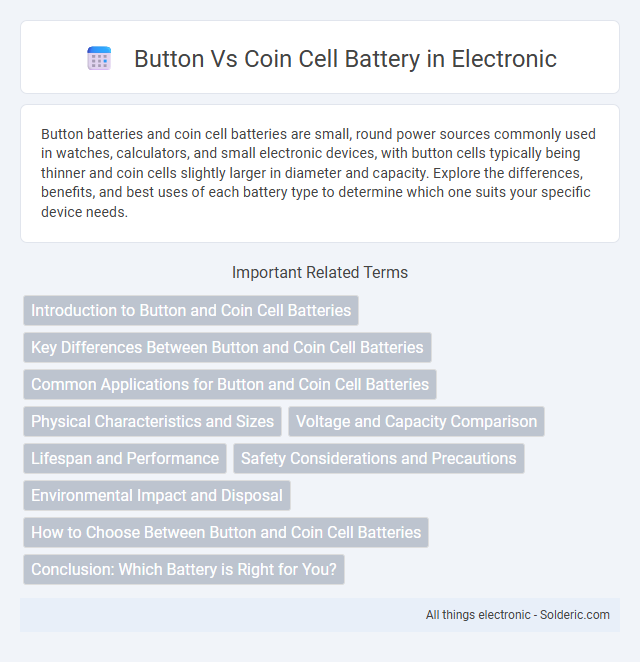Button batteries and coin cell batteries are small, round power sources commonly used in watches, calculators, and small electronic devices, with button cells typically being thinner and coin cells slightly larger in diameter and capacity. Explore the differences, benefits, and best uses of each battery type to determine which one suits your specific device needs.
Comparison Table
| Feature | Button Battery | Coin Cell Battery |
|---|---|---|
| Shape | Small, round, flat | Small, round, flat |
| Size | Varies; typically smaller diameter | Typically 5mm to 25mm diameter |
| Voltage | 1.5V to 3V | 1.5V to 3V (common types are 3V) |
| Capacity | Low to moderate (15mAh-150mAh) | Moderate (40mAh-220mAh) |
| Common Uses | Watches, calculators, small electronics | Hearing aids, watches, key fobs, medical devices |
| Chemistry Types | Alkaline, Silver Oxide, Lithium | Silver Oxide, Lithium, Alkaline |
| Energy Density | Moderate | High (especially lithium types) |
| Cost | Generally lower | Generally higher due to chemistry and capacity |
| Replacement Frequency | More frequent due to lower capacity | Less frequent; longer lifespan |
Introduction to Button and Coin Cell Batteries
Button and coin cell batteries are compact, round power sources commonly used in small electronic devices like watches, calculators, and hearing aids. Button cells typically have a smaller diameter and greater height, while coin cells are flatter with a larger diameter, influencing their applications and battery capacity. Both types are composed of similar chemistries such as silver oxide, lithium, or alkaline, but differ in form factor to optimize energy density and device compatibility.
Key Differences Between Button and Coin Cell Batteries
Button and coin cell batteries differ primarily in size and capacity, with button cells typically being smaller and thinner, designed for compact devices such as hearing aids and watches, while coin cells are larger with higher energy density for applications like calculators and key fobs. The chemical composition varies, with common types including lithium, silver oxide, and alkaline chemistries influencing voltage and lifespan. Additionally, physical shape distinguishes them, as button cells are more rounded and flat, whereas coin cells are thicker and cylindrical, impacting device compatibility and replacement requirements.
Common Applications for Button and Coin Cell Batteries
Button and coin cell batteries are commonly used in small, portable electronic devices such as watches, hearing aids, calculators, and remote controls. Coin cells are preferred for applications requiring higher capacity and longer life, like key fobs and medical devices, while button cells suit compact gadgets with lower power needs. Your choice depends on device size, power requirements, and battery lifespan essential for optimal performance.
Physical Characteristics and Sizes
Button batteries are small, round, and typically flat, with diameters ranging from 5 to 25 millimeters and thicknesses between 1.5 to 6 millimeters, designed for compact electronic devices. Coin cell batteries share similar dimensions but are generally wider and thinner, commonly measuring 11.6 to 24.5 millimeters in diameter and 2 to 5 millimeters in thickness, often used in watches and calculators. Both types prioritize space efficiency but vary slightly in shape and size to accommodate different power requirements and device designs.
Voltage and Capacity Comparison
Button batteries typically have a voltage range of 1.5V to 3V depending on the chemistry, while coin cell batteries commonly provide 3V with stable output for devices. Capacity varies with size and type; for example, a standard button cell like the LR44 offers around 110 mAh, whereas a CR2032 coin cell delivers approximately 220 mAh, effectively doubling the energy storage. These differences impact device runtime and voltage consistency, making coin cells preferable for longer-lasting applications requiring steady voltage.
Lifespan and Performance
Button batteries typically offer a lifespan ranging from 1 to 3 years, depending on usage and device power consumption, while coin cell batteries can last up to 10 years due to their larger capacity and slower energy depletion. Performance-wise, coin cell batteries provide a steadier voltage output under load, making them ideal for devices requiring consistent power over long periods. Your choice between button and coin cell batteries should consider the balance between device size constraints and the expected battery longevity for optimal functionality.
Safety Considerations and Precautions
Button and coin cell batteries require careful handling due to their small size and potential choking hazard, especially around children. Proper storage in secure compartments and avoiding exposure to high temperatures minimizes the risk of leakage or explosion. You should always dispose of these batteries according to local regulations to prevent environmental harm and accidental ingestion.
Environmental Impact and Disposal
Button batteries contain heavy metals like mercury, cadmium, and lead, posing significant environmental risks if improperly disposed of, as these toxins can leach into soil and water. Coin cell batteries, although smaller, also harbor harmful substances such as lithium and nickel, requiring specialized recycling methods to prevent ecological contamination. Proper disposal through hazardous waste programs minimizes environmental damage and promotes resource recovery from both battery types.
How to Choose Between Button and Coin Cell Batteries
Choosing between button and coin cell batteries depends on device size, power requirements, and lifespan needs. Button cells are smaller and ideal for compact devices with low power consumption, while coin cells generally offer higher capacity for longer use in slightly larger gadgets. Consider your device's voltage demands and space constraints to ensure optimal performance and battery life.
Conclusion: Which Battery is Right for You?
Button batteries offer compact size and reliable power for small devices like watches and hearing aids, while coin cell batteries provide higher capacity and longer lifespan for gadgets requiring more energy. Your choice depends on the device's power demands, size constraints, and usage duration. Evaluating these factors ensures you select the battery that best meets your needs for optimal performance and convenience.
Button vs Coin cell battery Infographic

 solderic.com
solderic.com